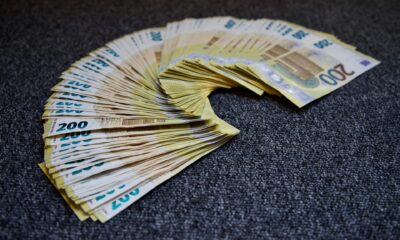Featured
SRI/ESG at the expense of smart beta
Nearly 40% of all investments in European sustainable and socially responsible funds go through ETFs, with which institutional investors are satisfied. According to the latest statistics from the ETFGI consulting firm, globally listed smart beta ETFs in the equity category suffered a net outflow of $2.2 billion in July. This brings net inflows to only 10.36% in the first seven months of the year.

EDHEC’s latest survey of the European exchange-traded fund (ETF) market confirmed the special and increasingly central place occupied by socially responsible investments (SRI) based on ESG criteria. Conducted as part of the EDHEC-Risk Institute research chair in partnership with asset manager Amundi, the survey revealed that nearly one in two European professionals (49%) now invest in sustainable SRI-ESG funds. Only 17% did so in 2011 and less than 20% five years ago. An even more significant proportion (55%) specifically use ETFs to gain exposure to sustainable investments.
The survey (EDHEC European ETF, Smart Beta & Factor Investing Survey 2020), published last week, was conducted via an online questionnaire with 191 institutional investors such as European asset management companies, pension funds, and asset managers, 16% of which are based in Switzerland. Their assets under management amount to more than 10 billion euros for at least 35% of them. Véronique Le Sourd, Senior Research Engineer at the EDHEC-Risk Institute and co-author of the survey, emphasizes that the rapid development of ETFs is not only due to their degree of use but also to the intensity with which they are used to invest in SRI-ESG strategies.
“In 2020, ETFs account for 39% of total investments in SRI-SGE funds, compared to only 13% in 2011,” wrote Véronique Le Sourd. “Moreover, 87% of the professionals surveyed using ETFs to invest in sustainable funds say they are satisfied.” It is interesting to compare this dynamic with that of smart beta and factor investment, the latter proving to be much more stable and having reached maturity. In 2015, 68% of European investors surveyed said they used ETFs to gain exposure to this asset class. Five years later, their share dropped slightly to 65%.
Find more about the latest survey on socially responsible investments (SRI) based on ESG criteria and read the most important financial news with the Born2Invest mobile app.
A sustainable ETF as expensive as it is popular
Even when considering financial instruments other than ETFs (such as traditional investment funds), the share of European professionals investing in smart beta and factor funds has only increased from 34% in 2015 to 47% today. This is a much less significant increase than that observed in the sustainable investment segment.
According to the latest statistics from the ETFGI consulting firm, globally listed smart beta ETFs in the equity category suffered a net outflow of $2.2 billion in July. This brings net inflows to only 10.36% in the first seven months of the year compared to inflows of nearly $53 billion in the same period last year.
A large number of sustainable ETFs
It is also not surprising that among the best performing ETFs – and the most resilient in times of crisis – are a significant number of sustainable ETFs. This is the case of the iShares Global Clean Energy UCITS ETF (INRG), which has risen 80% since the beginning of the year. In other words, 2.6 times the performance of US technology stocks and ten times that of the S&P 500. In the medium term, i.e. over the last five years, although its performance (138%) is lower than that of the Nasdaq (160%), it is no less impressive given the recent development of SRI-ESG investments.
As a reminder, the ETF INRG, also available in Switzerland and with total assets of more than $2.5 billion, invests in 30 global companies producing clean energy. The fund replicates the performance of the S&P Global Clean Energy Index, composed of 43% US-based constituents, followed by Chinese companies (13%). Finally, from a valuation perspective alone, the fund is not cheap. Reflecting the strong demand for it and the associated underlying values, the ETF is currently trading at a price-to-earnings ratio of over 32, according to the termsheet data provided by iShares (BlackRock). This compares to a ratio of around 25 for the Nasdaq, which is considered expensive from more than one perspective.
__
(Featured image by twenty20photos via envatoelements)
DISCLAIMER: This article was written by a third party contributor and does not reflect the opinion of Born2Invest, its management, staff or its associates. Please review our disclaimer for more information.
This article may include forward-looking statements. These forward-looking statements generally are identified by the words “believe,” “project,” “estimate,” “become,” “plan,” “will,” and similar expressions. These forward-looking statements involve known and unknown risks as well as uncertainties, including those discussed in the following cautionary statements and elsewhere in this article and on this site. Although the Company may believe that its expectations are based on reasonable assumptions, the actual results that the Company may achieve may differ materially from any forward-looking statements, which reflect the opinions of the management of the Company only as of the date hereof. Additionally, please make sure to read these important disclosures.
First published in AGEFI, a third-party contributor translated and adapted the article from the original. In case of discrepancy, the original will prevail.
Although we made reasonable efforts to provide accurate translations, some parts may be incorrect. Born2Invest assumes no responsibility for errors, omissions or ambiguities in the translations provided on this website. Any person or entity relying on translated content does so at their own risk. Born2Invest is not responsible for losses caused by such reliance on the accuracy or reliability of translated information. If you wish to report an error or inaccuracy in the translation, we encourage you to contact us.

-

 Africa1 week ago
Africa1 week agoMorocco’s Tax Reforms Show Tangible Results
-

 Biotech4 days ago
Biotech4 days agoUniversal Nanoparticle Platform Enables Multi-Isotope Cancer Diagnosis and Therapy
-

 Fintech2 weeks ago
Fintech2 weeks agoRuvo Raises $4.6M to Power Crypto-Pix Remittances Between Brazil and the U.S.
-

 Impact Investing21 hours ago
Impact Investing21 hours agoMainStreet Partners Barometer Reveals ESG Quality Gaps in European Funds
























